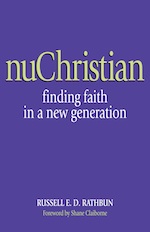Today’s guest post is written by author and pastor Russell Rathbun. I got to meet Russell at Princeton Seminary a few years ago, and really enjoyed hearing him preach. Russell is a founding minister with Debbie Blue of House of Mercy, a pioneering emergent church in St. Paul, Minnesota. He’s the author of a brand new book called nuChristian: Finding Faith in a New Generation. nuChristian responds to recent reports of Christianity’s image problem. In nuChristian, Russell offers practical suggestions for leaders who want to reach out to the new generation with a Christlike community that is transparent, holistic, loving, engaged, just and humble. I asked Russell to write a guest post today for his stop at Pomomusings on his Virtual Book Tour. I hope you enjoy his post, “What if a Church Had an Expiration Date?”
What If a Church Had an Expiration Date?

I have talked to a lot of people who are starting churches and a lot more people who are trying to keep churches from dying. Both missions are very hard to accomplish. So, I had an idea. What if you started a church with an expiration date? Say, five years. That would be just enough time for an energized core group to get together and build a unique community—an incarnation of the Body of Christ that addresses a particular time and place, the context in which they are living. They could welcome friends and newcomers who are interested, intrigued, and drawn in by the body’s particular vision, worship, service, study, and creativity, inviting the visitor to become part of the life of the community. Finally this expanded group of believers would begin to articulate new visions for changing contexts and to develop new core groups around those visions, groups who would then go out and start several new churches with new expiration dates.
This could solve some of the major quandaries that arise in starting and sustaining churches. The greatest help would be giving a particular incarnation of the Body of Christ permission to be done—to say that our mission in this time and place, in this specific context is finished. To say, “We may not have done everything we wanted, but we have been faithful to our vision.†Or to say, “We did everything we hoped to do. Now let’s go do something else.†If this permission to say “It is finished†caught on, then maybe churches that have been around for a long time could close up shop without feeling like they have failed. It would give any small group of folks with no resources but an emerging vision of what God could do in their context, the permission to do something for just awhile—perhaps for only a year or two. And they wouldn’t have to feel bad for not building the next Solomon’s Porch or Jacob’s Well.

The church of Jesus Christ is not closing its doors. Only particular contextual expressions of that church will do so. Is the church in Ephesus still going strong with the same vitality and vision it began with? Contexts, people, visions, and relationships change, but the charge to go into all the world making disciples does not.
The Church with an Expiration Date would guard against our human tendency toward idolatry—to idolize dynamic leaders or our ability to build institutions. It would staunch our pretenses to power and require a continual refocus on how we proclaim the gospel for the transformation of this particular group of people, in this particular cultural context. The Expiring Church could produce two, three, or ten new vital, living, unique incarnations of the Body of Christ—and you would never have to start that building fund.
WIN A FREE COPY Contest Over
You can win a free copy of Russell’s new book nuChristian. The first 3 people to email me the answer to the below Christian AS WELL AS their mailing address will get a free copy. But it MUST be emailed to me here.
Question: What is the name of Russell Rathbun’s alter-ego?